I’m Not Crying. It’s Just the Onion… Games.
A tribute piece to Onion Games and a story about how the cult-classic Nintendo Wii title, Little King’s Story, helped me cope with the aftermath of a house fire and my parents’ divorce.
 UnexpectedGames
UnexpectedGames
Just a friendly bear who works in financial reporting that would rather be playing, writing or talking about video games. https://twitch.tv/unexpectedenemy
A tribute piece to Onion Games and a story about how the cult-classic Nintendo Wii title, Little King’s Story, helped me cope with the aftermath of a house fire and my parents’ divorce.
When I was in college, I worked at a GameStop part-time. I would dread most shifts because although gaming has been a passion of mine since I was a kid, working in retail at a video game store was not as glamorous as your younger self dreamed it to be. I also happened to work during the peak of the Nintendo Wii era, so most week nights/weekends were met with angry parents who couldn’t score the much sought-after console, especially around the holidays. With that said, there were the occasional moment or two that reminded me why I enjoyed working there. The story below was one of them.
I’ve always loved weird/quirky Japanese games and as far as I could remember, I’ve naturally aligned myself with the underdogs of gaming; the types of games that were “Indie” before it became the successful sub-genre or rebellious, anti-“AAA” space that it is today. It feels like I’ve been championing less-talked about titles for decades, but outside of the wandering, eccentric forum dweller or two who shared a similar passion, I haven’t met many people like myself. During one shift late in 2009, a kid and his mother walked into my store and began browsing the Nintendo Wii section of the shop. I kept my distance and let them peruse the aisles as I fully expected them to select some 1st-party Nintendo game or the random shovelware title of the week. To my surprise, the kid brought three games to the counter that spoke my language; Tales of Symphonia: Dawn of the New World, Valhalla Knights: Eldar Saga and the true gem of the bunch, Yoshiro Kimura’s Little King’s Story. The catch? He could only choose one.
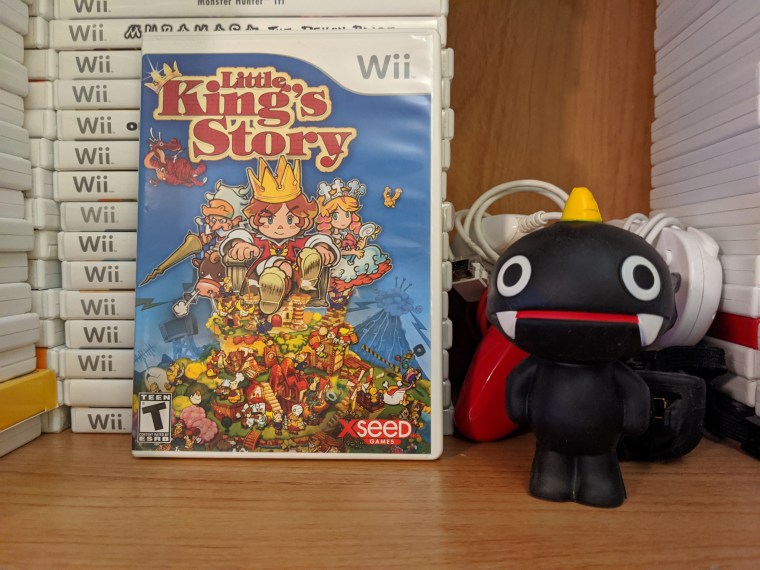
These moments were far and few between at a job that I mostly hated. I could finally passionately sell something that I loved without asking someone to pre-order the next Madden/Call of Duty game or sell them on our magazine subscription. This kid knew what was up, too. He was mostly quiet, clearly introverted but had specific interests, much like myself at that age. At this point, it was my sole purpose to sell him on Little King’s Story and dissuade him and his mother from choosing one of the other games. Tales of Symphonia: Dawn of the New World was an easy conversation, “Unless you’re a huge fan of the original game, you’re probably going to be lost with this one. It’s a direct sequel that hasn’t been getting the greatest reviews.”. Pass. Valhalla Knights: Eldar Saga was even easier to undersell. “It’s just… not good, trust me.”, I recall saying. Simple enough, a sale for Little King’s Story was in the books!
Little King’s Story is a whimsical adventure which takes place in an imaginary kingdom through the eyes of a young boy. You play as Corobo, a young kid who stumbles upon a make-believe land while playing in his bedroom. Upon arriving to this kingdom, he’s crowned king and is asked to save numerous princesses from evil kings who have ravaged the land. Your citizens can be assigned roles (such as a soldier, carpenter, or even a farmer) and each class can essentially be used for combat or other town-building means. Some have said Little King’s Story felt like a cross between Harvest Moon and Pikmin, and it’s a fair comparison considering Yasuhiro Wada had his hands on the project. But there’s much more here if you’re willing to give the game its due time. What resonated with me the most about the game was how it explored mature themes, ideas and issues such as mortality, religion, philosophy, and even alcoholism, despite looking like a game designed for/aimed at children.

Little King’s Story also got me through a very difficult time in my life. In January of 2009, my family went through a devastating house fire. We lost nearly everything, including most of our pets. During this hellish period of my life, I lived between a relative’s house and a temporary home, as the house I grew-up in was demolished and rebuilt. I was still a student at the time, but I had to quit my part-time job to focus on my studies. Nearly three months after the fire, Little King’s Story released. During the summer of 2009, when there was some semblance of normalcy returning to my life, I was at a friends house with my brother, playing Little King’s Story of all things. Towards the end of our visit, however, we received a message from our mother saying that our father came home with divorce papers.
Major Little King’s Story SPOILERS Below
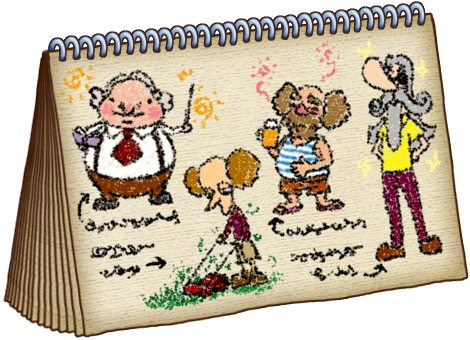
For as long as I could remember, my parents acted more like roommates than a married couple, so I knew separation was inevitable. It was the timing of it all that left me completely broken, however. So why is this game so important to me? Towards the end of Little King’s Story, it’s revealed that the characters/people you meet over the course of the game are actually imaginary characters based on real-life individuals from the boy’s life. At the time, it definitely made me think about my childhood and how I saw my parents growing-up. I had always wondered if things would have been different if my parents were to have divorced at a younger age. Regardless, I saw myself in Corobo, the kid from the opening sequence, playing in his bedroom and using his imagination to escape from reality.
Despite being a full-time hobby and passion of mine today, video games have certainly been a form of escapism for the majority of my life, so to say that Little King’s Story helped me cope with the aftermath of a house fire and my parents’ divorce would be an understatement. In 2020, considering the state of the world (a global pandemic, political chaos and social/civil unrest), games that provide a certain level of personal comfort are more important than ever.
Onion Games is a Japanese independent studio consisting of a handful of industry veterans, including Yoshiro Kimura, Kurashima Kazuyuki and Hirofumi Taniguchi.

Yoshiro Kimura is no stranger to the games industry. His work dates all the way back to the early Romancing SaGa games as both a dungeon map and combat battle designer, respectively. He would then go on to do game & scenario design on the cult-classic moon (which recently launched for the first time in English after 23 years) in addition to directing the aforementioned title, Little King’s Story. He’s mostly now known for games like Million Onion Hotel, Black Bird and Dandy Dungeon -Legend of Brave Yamada-, under his new independent studio, Onion Games.
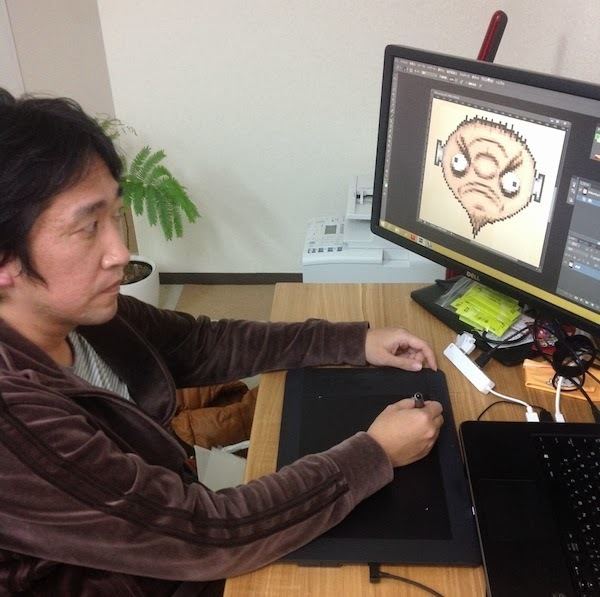
Kurashima Kazuyuki would probably be best known for his monster/character designs in Super Mario RPG: Legend of the Seven Stars on the SNES, but if you’re more familiar with titles from Onion Games, you’ll notice his distinct style and consistent approach to pixel creation and sprite-work. Reoccurring characters/sprites can be found in most, if not all of Onion Game’s current titles and I’d like to think Kazuyuki-san had a say in this. There’s clearly an overarching “Onion-verse” in the making here.

If you like the sound design and music from games like Black Bird and Million Onion Hotel, you’d probably be surprised to hear that Hirofumi Taniguchi’s work dates all the way back to Konami classics like the original Suikoden and Contra: Hard Corps.

A lot of the developers from LOVE-de-LIC would eventually find themselves at other studios, working on projects and developing games for a variety of platforms over the years. Kimura-san and company may not have had direct oversight on all of the games shown above, but there’s certainly consistent/overarching themes present throughout all of the aforementioned titles, a through-line if you will; one of love, compassion and kindness.

Black Bird is a side-scrolling shooter that pays homage to the classic arcade-shootes of yesterday, such as Fantasy Zone. At the time of its release, their previous games were exclusive to mobile devices, so Black Bird was Onion Game’s first console/PC debut and boy was it one weird game! You could say that Black Bird’s presentation evokes a silent film from the 1920s, complete with the film graininess and strange vignettes between scenes you’d come to expect. There’s no spoken dialogue, but the game appears to portray the life of an orphaned girl whose parents were killed in gruesome accidents (or even murdered?). Regardless of your interpretation of the plot, you’re not really here for the story.
After the girl appears to be shied away from an orphanage, the little one collapses and a man with a cane turns her into an egg, which ultimately hatches and becomes a disembodied crow-like head that wrecks havoc on the inhabitants of what appears to be a European-styled town. It’s dark and disturbing yet nonetheless charming due to its cute sprites, strange denizens and enemies that animate, dance and march throughout the city streets. The player can fly left or right and the stage will loop until all target enemies (towers) are eliminated. Each level culminates in bizarre boss battles, which are supposed to resemble the things/people who have scarred/harmed the girl from her past. Black Bird is also relatively short, but it is meant to be replayed as there are multiple endings based on certain max/total score thresholds. In each level, there are hidden characters to shoot for bonus points and opportunities to earn more health, screen-clearing bombs and speed power-ups (which make the player move faster).
Black Bird’s got traditional “shmup/STG” mechanics at its core, but every other strange element melds together to create a rather pleasant experience. Completing each stage quickly while using bombs at max score multiplier is the intended way to play, as the “True Ending” is quite difficult to achieve if you don’t know the game/enemy patterns by heart. It’s not the easiest shooter, either. There are no lives/continues, however, the crow’s hit-box is rather small and there are plenty of opportunities to stock extra health, bombs and the like. There’s a nice risk/reward system at play here, too. Play defensively and hoard bombs/health to survive or play aggressively (yet smart) in order to climb the leader-boards and earn the coveted best ending.

Dandy Dungeon is one-half game-dev simulator, another half dungeon crawler and one big existential crisis! The game portrays the life of an up & coming programmer who, in his spare time, codes his very own indie game (alone in his apartment dressed in nothing but a pair of boxers) in order to win the affection of his neighbor. It’s quirky, weird, yet extremely charming, just like Black Bird (only perhaps not as twisted/demented). The game itself is a pseudo rouge-like RPG in the same vein as say Spike Chunsoft’s Shiren the Wanderer or Namco’s Tower of Druaga. Based on the experiences Yamada has with his friends, neighbors and co-workers, he will implement new ideas into his game, which bring about new gameplay mechanics when venturing into the game’s numerous dungeons. There are also extremely funny, well-written scenes between each stage that pushes the charming, yet sometimes creepy story forward.
The dungeons are comprised of single-screen floors, which if you’re playing on the now offline-only mobile version, must be navigated by tracing a line and creating a path across the tiles with your finger. On the Switch, you can simply use the analog stick to draw your path. If the player manages to route a path through the floor in one-fell swoop, they’ll receive a bonus at the end of the dungeon, too. Combat is also turn-based and the player can arm themselves with equipment (which can be upgraded with materials) and items they procure from each level. It’s a simple concept that was certainly well-suited for mobile devices, but feels like a perfect fit on both PC and Switch platforms. There’s a surprising amount of content here too, and considering the PC and Switch versions have been updated with free DLC (essentially, the game’s sequel), there’s a lot of love to go around.

Million Onion Hotel, on the other hand, is a difficult game to describe for the uninformed. Although I’m relatively unfamiliar with the sub-genre, glorified tapper-games (or what are commonly known as “clickers”), have been prevalent on the mobile scene for quite some time. Million Onion Hotel is another point & tap game where the goal is to clear multiple screens in a timely manner while maximizing your score. It sounds simple at first, but there’s actually a ton of nuance and depth available for those who choose to play the game beyond a few quick sessions. Each stage is comprised of a series of increasingly difficult levels played out on a 5×5 grid. Players must tap onions and other strange creatures that pop-up to earn points. When a square on the grid is tapped, it turns red and when a line is formed, the player earns additional time. When two or more lines are formed at once, the player enters a special state and the opportunity to earn even more goodies presents itself. The screen can become quite chaotic and it’s certainly not a game I’d recommend playing in public (unless you’re good with people judging you from afar).
Million Onion Hotel, at times, feels like some strange variant of whack-a-mole. As bosses are defeated, new enemies are introduced (which take additional taps to remove) and other traps and oddities spring-up from the grid. These obstacles prevent the player from creating those much sought-after single/double line-clears, too. In addition to these new variables, there’s also a handful of silent vignettes sprinkled between the stages. There’s an attempt at a story here, but it’s weird, mature and surprisingly graphic. One minute a man and a woman are having dinner at a classy joint (presumably the hotel), and then they’re sleeping together only to be interrupted by some turf-war between the military and FBI. Shots are fired, blood is spelt and failing heart-beats trigger remote rocket ships that destroy the very same hotel you’re presumably managing. Most mobile games are like this, right?
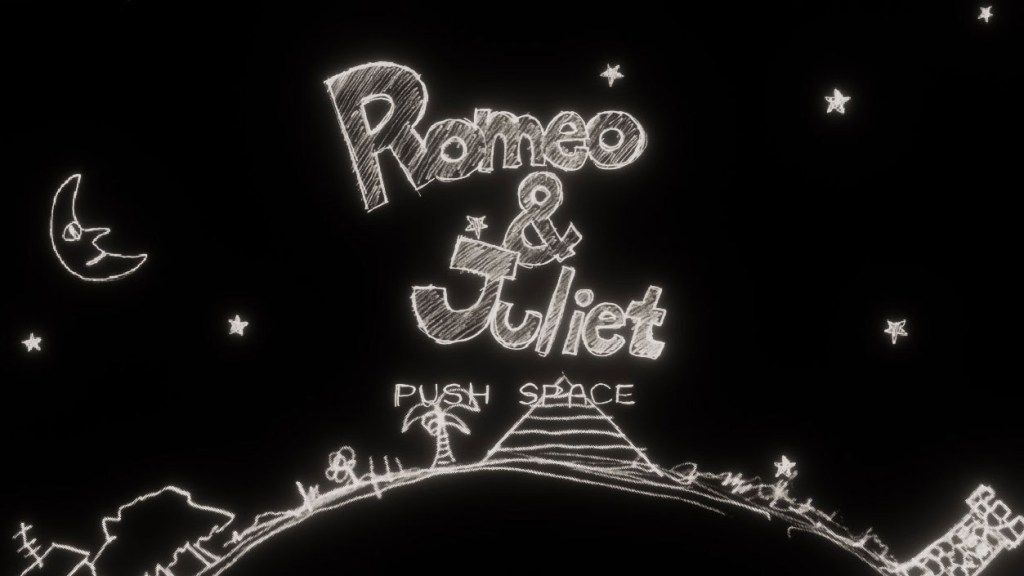
Finally, there’s ROMEO & JULIET for PC. By subscribing to their newsletter, you can download and play the game for free. ROMEO & JULIET is an incredibly simple game and the developers themselves describe the game as a “Mini Game”, at least according to their website. Aesthetically, it looks like someone drew the game with chalk, but it still carries that weird, quirky charm you’ve come to expect from Onion Games. It’s also a single-screen game; there’s no addition levels, screens or unlockables. ROMEO & JULIET is an arcade game in the purest sense and it heralds back to the era of Pac-Man and the original Donkey Kong.
In ROMEO & JULIET, your character is constantly spinning to the right and by pressing/holding the “left arrow” key, you’ll start twirling to the left. The 2D plane that you’re on is extraordinarily small and your goal is to catch items falling from the sky while avoiding hazards that drop along with them. Mechanically, it’s mostly similar to Onion Game’s Black Bird, at least in a score-chasing sense. There’s this constant feeling or risk/reward, which is extremely hard to capture in an arcade game. Do you risk your life for the larger items that give (presumably) more points or do you keep the combo multiplier going by grabbing what’s about to hit the floor? As soon as something hits the floor, your combo multiplier resets and once you reach Level 100, the game’s over.
It’s incredible satisfying to maintain your combo and because of the instant restart time, I found myself saying “just one more time” every time I failed. Unfortunately, there’s not a whole lot of replay value, but there is an ending if you reach a certain score threshold (another similarity to Black Bird). With that said, the game was free if you subscribed to their online news letter/website (which you should!).
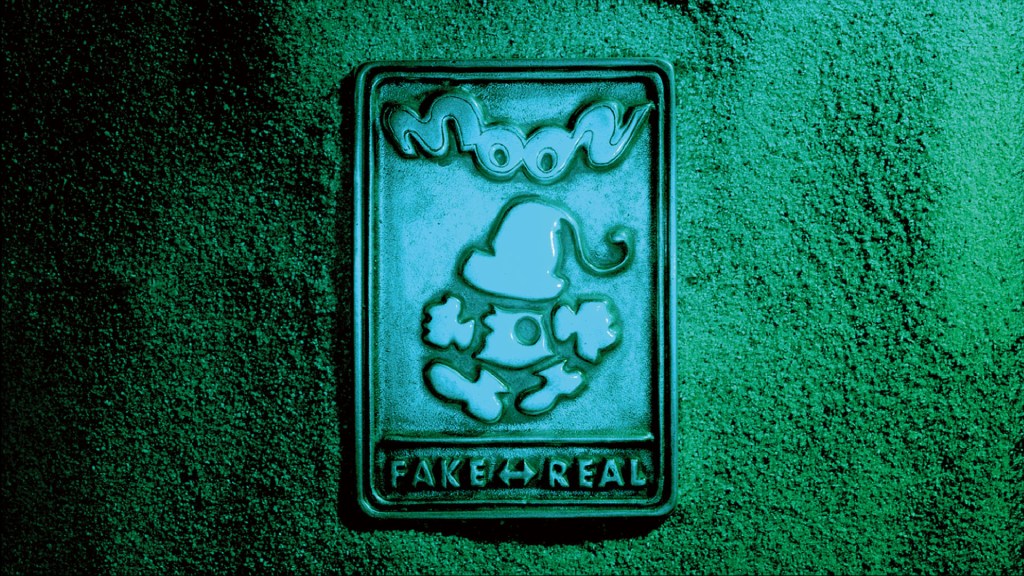
After nearly 23 years, Onion Games has officially released the English version of the cult-classic, anti-RPG, Moon: Remix RPG Adventure (now stylized as simply, moon) , which has arguably paved the way for the indie darlings of today. As I’ve mentioned earlier, before “Indie” games became the recognizable, respectful, and successful sub-genre and anti-“AAA” space that it is today, games like moon were ahead of the curve, subverting your expectations as early as 1997. In moon, much like Little King’s Story, you play as a young boy who gets whisked away to a fantasy world where you essentially play cleanup after a so-called “Hero” devastates and pillages the land. Toby Fox, the mind behind the extremely successful, modern-day indie title, Undertale, has gone on record recently stating how important/inspirational moon was to him, too. I haven’t had a chance to play the game yet, but I’m saving some time off from work around the holidays so that I can give the game the attention it deserves.
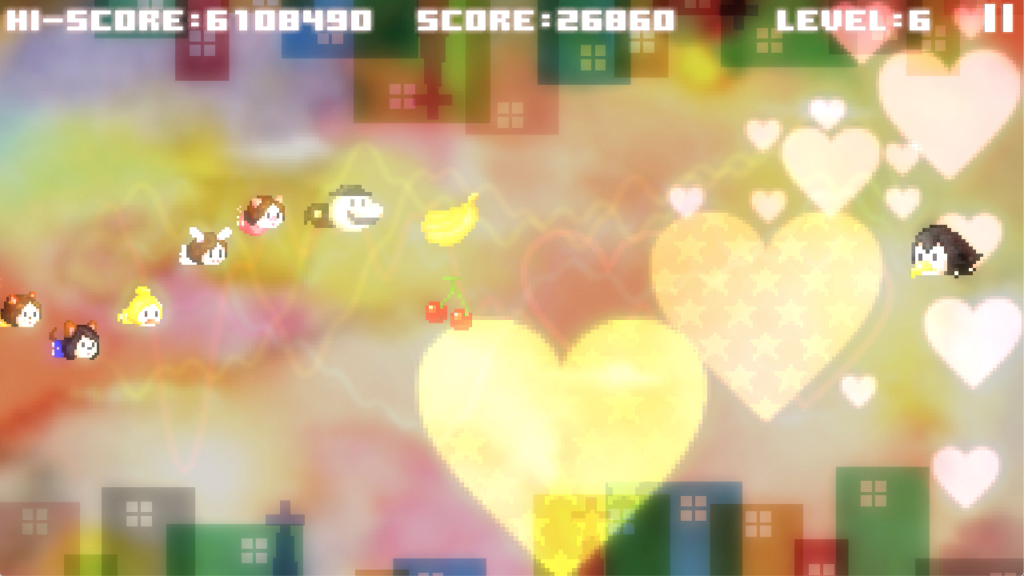
Finally, their latest effort, Mon Amour, has also been announced, which looks to share the most similarities to Black Bird and Yoshirou Kimura’s Chulip (another game about kissing people in order to progress). It’s apparently a side-scrolling “smooch ’em up” where you simply kiss individuals while flying through traditional shoot ’em up stages. I’m guessing there are hazards to avoid and fruit to collect along the way in order to reach a high-score? Who knows. Regardless, it looks like Onion Games will continue to provide the love this world so desperately needs right now.
See you next time,
-Matty